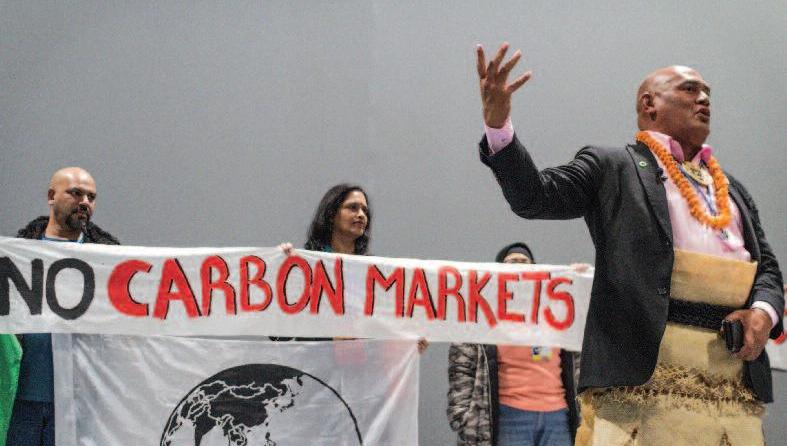
9 minute read
Climate talks delayed but our collective struggle continues
Protest about Carbon Markets at Madrid Climate Conference. Photo: Victor Barro / FOEI
By Sara Shaw Friends of the Earth International’s Climate Justice & Energy Programme Coordinator
Advertisement
This week marks the moment when activists from around the world would have gathered together on the streets of Glasgow to call for Climate Justice. The halls of the SEC would have been packed with delegates, civil society and, somewhat depressingly, fossil fuel lobbyists, for COP26 – the 26th year of UN climate talks.
However, 2020 has not gone according to plan and the SEC, and the streets of Glasgow are standing largely silent. Covid-19 has brought huge suffering globally, and is compounding the interrelated climate, environmental and inequality crises, especially in the global South.
Understandably, COP26 is postponed to November 2021. This is a blow for climate activists around the world, especially those hit hardest by the impacts of the climate crisis. While the pace of negotiations is achingly slow, and the talks are weighted in favour of the global North, delivering only a fraction of the level of climate action needed to address the climate emergency, this is the one global forum where, in theory, every country gets an equal voice. Of course real world power relations, not to mention the pressure that big polluters exercise, come into play.
What is at stake in Glasgow
Some of what the climate justice movement does at these talks is hold back the tide – for example there is a huge push by some governments backed by big polluters to finalise agreement on new global carbon markets. Carbon markets allow polluters to continue emitting greenhouse gases, for a price. This means that those with the money and power to do so (who are most responsible for climate change and should be doing the most to cut their emissions) are able to continue with business as usual. Carbon markets also lead to land grabs and human rights abuses in the global South. The global climate movement managed to block agreement on new markets at COP25 in Madrid, and this is a fight we will continue in Glasgow.
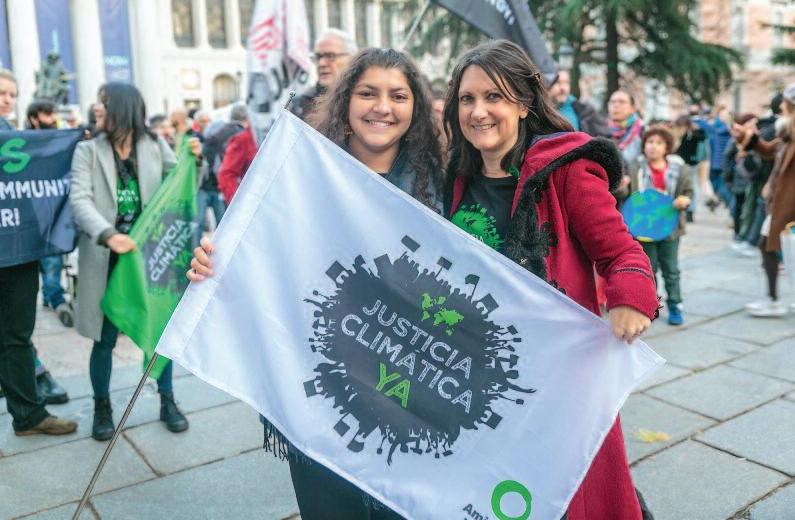
(l–r) Dipti and Sara, FoE International Programme Coordinators. Photo: Babawale Obayanju / FoEI
The talks will also be important because despite years of wrangling we still don’t have finance in place to compensate poor communities for irrecoverable loss and damage due to climate change. Nor are rich countries meeting their commitments to provide finance for developing countries to adapt and transform their energy systems. This is not optional generosity but a debt owed by rich countries who have caused the most climate damage.
Without this money developing countries will struggle to make a just transition away from fossil fuels and ensure that everyone has access to safe clean energy. We must fight for climate finance at the national and international level.
2020 is the year when countries were meant to ramp up their climate targets. So far action has been sluggish. We need to keep the pressure up at the national level through this year and into next to see bold and ambitious commitments in line with countries' fair shares. The danger is rich countries will hide behind weak ‘net zero’ targets to evade responsibility, disguise climate inaction, and in some cases even scale up fossil fuel extraction and burning. They must be held to account and pushed harder so that at COP26 there is genuine progress towards reducing emissions in line with climate science in a fair way.
This month global civil society will gather online for From the Ground Up hosted by the COP26 coalition. Next year, we hope we will be together again in person. Because the COP is not just a moment for governments inside a conference centre. It is also a moment for activists from across the global to gather together, to learn from one another's struggles, to gain strength and inspiration for the fights ahead and to demand climate justice from our leaders.
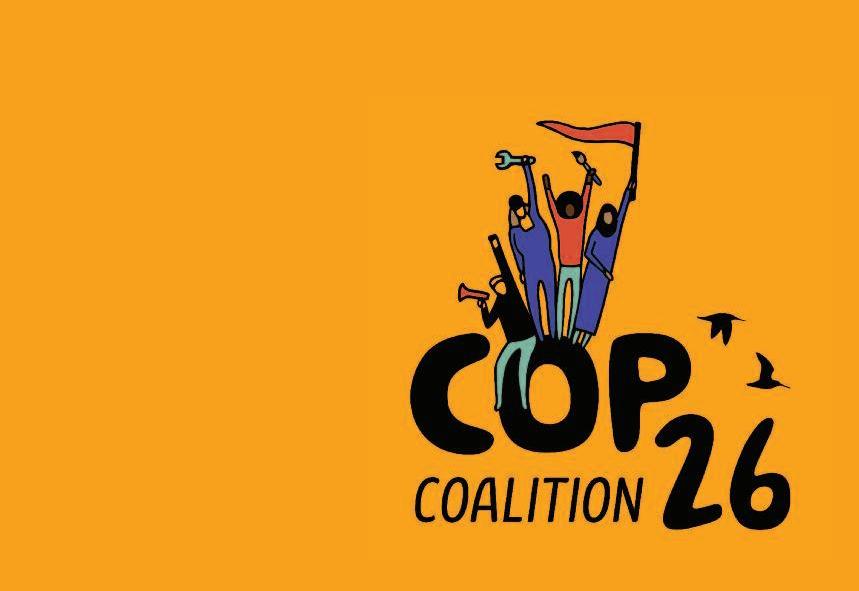
COP26 Coalition is organising from the ground up
By Camille Barbagallo & Quan Nguyen, COP26 Coalition Coordinators
With Scotland and the rest of Europe now being in the middle of a second wave, most of us know that the COVID-19 pandemic has only given us a taste of what to expect from the “new normal” of climate breakdown, as the impacts fall with violent disproportionality between the wealthy and the poor.
Before lockdown, Glasgow was poised to host annual UN climate change negotiations (COP26). The November 2020 summit was billed as yet another crucial effort to bring countries together to step up efforts to rapidly reduce carbon emissions in the face of climate breakdown.
Postponed until November 2021, COP26 will now be one of the first meetings of world leaders in the wake of COVID-19. They will be seeking a pathway to recover from the worst economic downturn since the Great Depression. So far, nothing indicates that their chosen path will lead to a fairer, more sustainable global society – rather the opposite. This responsibility falls to our movement and our allies, both in Scotland and abroad, to demand that this so-called recovery be green, just, and global, tackling the scourges of inequality and climate breakdown at their roots. Now is the time to talk about climate change, call out polluters and profiteers, and build a powerful global movement to tackle multiple crises and fight common injustices.
The COP26 Coalition – drawn from civil society in Scotland, the UK and the world – has come together to fight for real, transformative solutions to the climate crisis. We are organising for change from the ground up – centring the voices of those most affected by the multiple crises and building a space for action and hope.
London Climate Strike 2019. Photo Nathan Thanki
Over the next year, we hope to build a global campaign of escalation, holding governments and corporations to account over their failure. We will mobilise around the Scottish elections, the G7 meeting in the UK in 2021, support direct climate action against the fossil fuel industry, and support our international allies in taking action. When COP26 takes place, we will be ready to call out the governments’ greenwashing and corporate false solutions.
To mark when the COP would have taken place, we are organising From the Ground Up –Global Gathering for Climate Justice. This will host online discussion on a range of issues which are central to understanding the struggles of those resisting climate breakdown as well as how we create just solutions and use the knowledge of those most affected.
Reflecting the diversity of action people can take we will also host workshops on topics such as resisting polluting projects in your community, starting a community garden, campaigning during the pandemic and tips for avoiding activist burn out.
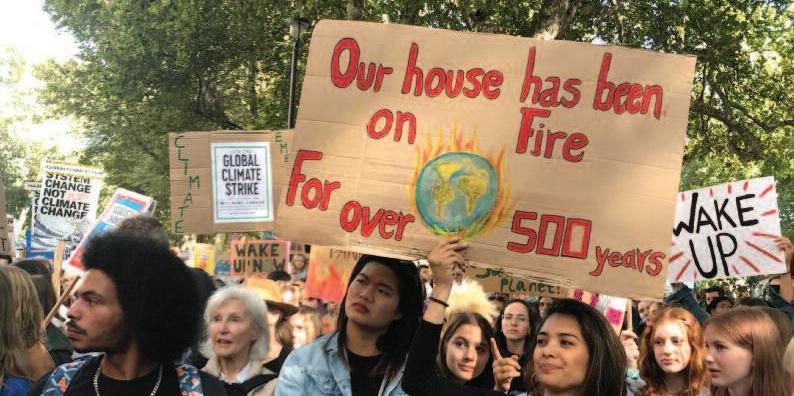
This Global Gathering is an opportunity for Scottish, UK, European and international climate justice movements to build momentum and capacity, and to connect to broader civil society to build power for system change. We aim to provide a space for coming together in these times of isolation, to connect and share the diversity of experiences that make our movements so powerful.
The change we want will not be given to us by our leaders. We need to organise it ourselves from the ground up.
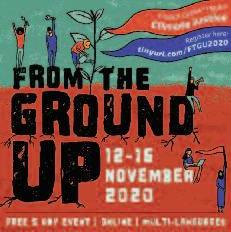
Friends of the Earth Scotland are a founding member of the COP26 UK Coalition.
No place for polluters at Glasgow Climate Talks
By Scott Tully, Glasgow Calls Out Polluters
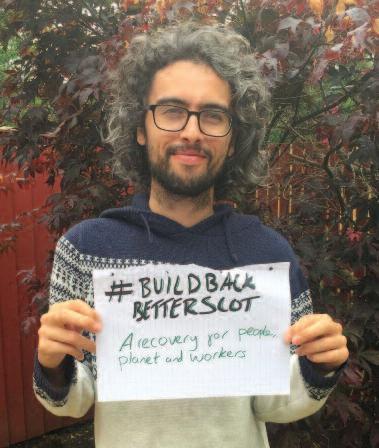

So, the UN climate talks a.k.a. COP26 is coming to my home city of Glasgow and I still have to pinch myself: one of the most important international summits to date is a half hour walk from my flat!
I can only speculate as to why Glasgow, of all places, was chosen. But once I knew that Glasgow was the venue, I felt a sense of opportunity and responsibility to organise around this historic moment.
Now, of course, I was not alone in thinking this. The UK Divestment movement – which I am also involved with – had agreed at a gathering in Autumn 2019 to focus on COP26. This makes sense, as divestment activists are quite used to opposing the presence of big polluters in our institutions, and one of the major issues with the COP has been the insidious presence of big polluters within the talks. One of our activists described Madrid’s COP25 as a playground for polluters, which seems about right. And previous UN climate conferences haven’t been much better: coal companies get sponsorship deals, shady lobby groups run free and Shell even claimed to have written some of the Paris Agreement. It is no surprise that past COPs advanced some of the most tired (but corporate-friendly) solutions such as carbon markets, whilst the serious and binding change we need remains absent.
In response to this problem, Glasgow Calls Out Polluters aims to prevent big polluters from influencing the talks. We include any large company that profits from planetary destruction in that definition. This includes fossil fuel financing banks, biomass companies and airlines, for example.
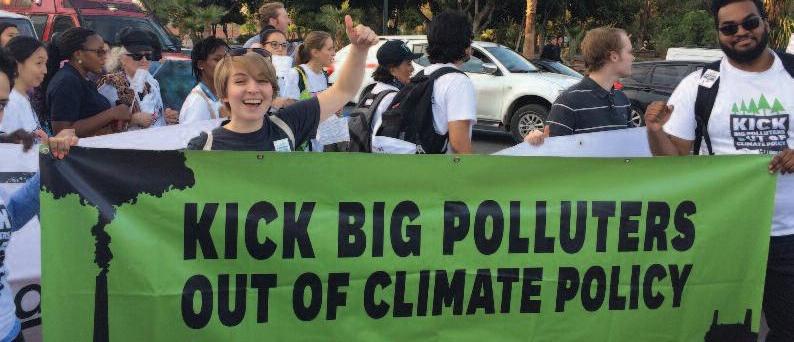
We demand that governments should not take sponsorship money from fossil fuel companies or major polluters. The UK Government – as host nation – should push for actual emissions reductions instead of passing the buck onto speculative technological solutions. And the UN should create a Conflict of Interest Policy. Just as Big Tobacco are not allowed at World Health Organisation events, big polluters should not be allowed at climate talks.
As we now know, COP26 was delayed until November 2021. Whilst there are a lot of COP-related decisions that I find objectionable, this one was at least understandable, given the all-consuming nature of the pandemic. It’s far from ideal that the global action we so desperately need gets delayed for another year, but from an organising perspective it has afforded the strange luxury of an extra year of planning. We have continued to organise trying to kick big polluters out of COP26 and also gravitated towards challenging the Scottish Government's relationship with big polluters. We have written an open letter to the UK Government, a petition in collaboration with groups such as 350.org and are launching our tongue-in-cheek Scottish Polluter Awards, which should be on our website by the time this is published.
But we are planning more action over the next few months and are hoping to accelerate our campaign. If you are someone who is equally appalled at the space major Polluters get to influence climate policy, and want to take action, feel free to get in touch!





